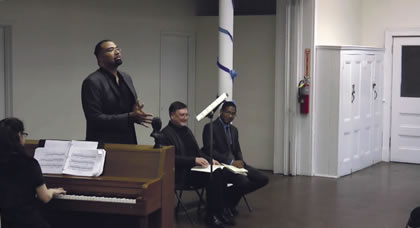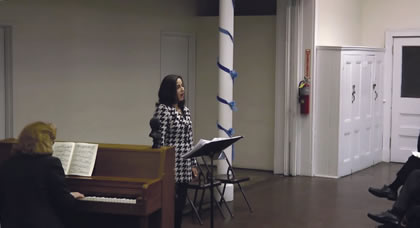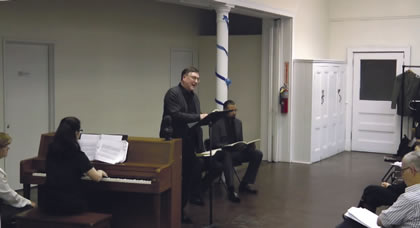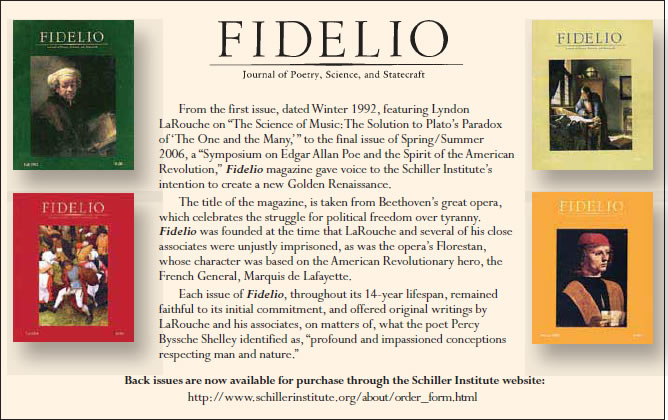Schubert’s Schwanengesang
And the Manhattan Project
Watch the video, see the programThe silver Swan, who, living, had no Note,
when Death approached, unlocked her silent throat.
Leaning her breast upon the reedy shore,
Thus sang her first and last, and sang no more:
“Farewell, all joys! O Death, come close mine eyes!
More Geese than Swans now live, more Fools than Wise.”—Lyrics to a Madrigal
by Orlando Gibbons (1583-1625)
November 23, 2015 —It is nearly impossible to produce great art in a society dominated by fools. In a society dominated by such as Barack Obama, reproducing Classical principles of great art, and of music in particular, to reintroduce these principles into the daily experience of Americans, is, though a daunting task, also a moral necessity of the first order.
Capitulation to the deadly banality of today’s “popular culture” need not be our society’s only choice. The Schiller Institute demonstrated on Saturday evening, November 21, in a Manhattan “music evening,” that true creativity, produced by geniuses such as the composer Franz Schubert (who died 187 years ago on November 19 at the age of 31), can be experienced, captured, reproduced, and transmitted by a dedicated ensemble that is selflessly intent on “communicating and receiving intense and impassioned conceptions respecting man and nature” to their fellow citizens.
The Song Cycle as a Whole
 View full size Schiller Institute
Tenor Everett Suttle, being accompanied by Cheryl Berard at the piano. Seated to the right are John Sigerson (center) and Frank Mathis. |
This presentation of Schubert’s collected last songs, Schwanengesang, D. 957, was unusual. Three singers, tenors John Sigerson and Everett Suttle, and baritone Frank Mathis, jointly performed the cycle, the which consists primarily of the works of three poets contemporary with Schubert: Ludwig Rellstab, Heinrich Heine, and Jacob Seidl. That interaction, and its evolution over the course of the fourteen songs that comprise the whole, culminated in Suttle’s very effective singing of “Die Taubenpost” (probably Schubert’s last composed song). This made accessible to the 80 people in attendance—a perfect-sized audience for an authentic “Schubertiade”—not merely the songs, or the “song cycle,” but also the discovery, through the musicians themselves, including accompanist Cheryl Berard, of the process of discovery of the composition as a whole.
It was remarked upon by the musicians that not only was the audience unusually attentive, following each song very carefully, equipped in many cases with English translations of the text. But beyond mere attention, the audience was engaged in working through the living medium of the minds and the voices of the musicians, to grapple with the devastating musical irony often lurking just behind “the words of the poems,” behind their musical settings. This is what William Empson, in his Seven Types of Ambiguity, alludes to when he says: “Metaphor. . . is the normal mode of development of a language.”
Metaphor, and therefore poetry, rather than symbolism, “imagery,” or mere “tuned words,” is the only reliable means for the presentation of truly human ideas,—and metaphor was present in this performance. At the conclusion of the program, one audience member remarked to Everett Suttle that he had decided to watch the concert by concentrating on Suttle’s changing facial expressions, as that tenor, with increasing delight, watched his colleagues, Sigerson and Mathis—and implicitly himself—perform the cycle’s successive songs, not as “pieces,” but as a singularity,—a single unity of effect.
The Power of Beauty
 View full size Schiller Institute
The Schubert Evening was opened by soprano Michelle Fuchs, accompanied by Margaret Greenspan at the piano. |
Soprano Michelle Fuchs preceded the Schwanengesang with three Schubert Lieder: “Im Frühling,” “Frühlingsglaube,” and “Du bist die Ruh” (“Springtime,” “Spring Faith,” and “You Are Repose”). How a concert, or any other presentation of an important idea begins, is all-important in terms of what follows. There were several beautiful things done here; let one example from “Frühlingsglaube” (Spring Faith) suffice.
The poetic line “Nun muss sich alles, alles wenden” is changed completely the second time—as the line of poetry itself compels. The listener first hears the poetic idea, and then hears it differently, because Schubert the composer musically does, what the poetical idea “says”—“now must all things change.” Fuchs and accompanist Margaret Greenspan fully performed this metaphor, without calling any attention to it. This was done even more so in “Du bist die Ruh” (You Are Repose). Each of the three opening Schubert songs built upon the meaning of the other, providing the platform for the Schwanengesang song-cycle.
 View full size Schiller Institute
Tenor John Sigerson, being accompanied by Cheryl Berard. |
Diane Sare, founder and director of the New York Schiller Institute Community Chorus, and member of the Policy Committee of the LaRouche Political Action Committee, pointed out that several musicians, including those involved in this performance, began a collaboration with the Schiller Institute less than a year ago for the purpose of supplanting the non-stop ugliness of fear/hatred presently sweeping the nation and the world. To that end, the project of recruiting hundreds, and even thousands, to what Lyndon LaRouche has termed “the Manhattan Project” by means of their participation in building and becoming members of the Community Chorus, has improved the attention span, and moral depth, of those that have taken up this challenge to the normal death-culture that is promulgated daily as “entertainment.”
“Entertainment,”—such as the violent video-games which have become the major pre-requisite for joining a military which is now being rapidly transformed in certain sections into death-squads,—requires an anti-musical, anti-creative mind-set. The American citizens’ ability to understand Russia, China, India, and the New Silk Road/World Land-Bridge, will increase dramatically as this process of chorus recruitment is brought to fruition in Manhattan.
While several professional musicians who attended the Schubertiade were very happy about the quality of the performances, conductor Sare emphasized that the “the audience was as intense as the performers.” The Saturday Manhattan project dialogue with Lyndon LaRouche, the music classes using the Italian solfeggio method, and the organizing of “the 1,500-person chorus,” are now mutually reinforcing processes in a singular “field” called Manhattan—and this can become the musical means by which to defeat the submission to “fear itself” that is presently “paralyzing needed efforts to convert retreat into advance” throughout the United States of Obama-who-must-be-removed.
 Go to order form View advertisement full size |
 Order from store.larouchepub.com | View advertisement full size |
